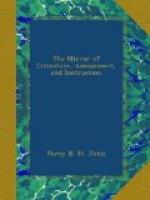She hurried the feeble old man along the road leading to the rectory, but returned no answer to his inquiries. The servant told her, when she arrived at her destination, that his master was engaged—particularly engaged—could not be disturbed—Sir Thomas Purcel was with him; and, as the man spoke, the study-door opened, and Sir Thomas crossed the hall.
“Come back with me, sir,” exclaimed Grace Huntley, eagerly: “I can tell you all you want to know.”
The Baronet shook off the hand she had laid upon his arm as if she were a maniac.
Grace appeared to read the expression of his countenance. “I am not mad, Sir Thomas Purcel,” she continued, in a suppressed tremulous voice; “not mad, though I may be so soon. Keep back these people, and return with me. Mr. Glasscott knows I am not mad.”
She passed into the study with a resolute step, and held the door for Sir Thomas to enter. Her father followed also, as a child traces its mother’s footsteps, and looked around him, and at his daughter, with weak astonishment. One or two of the servants, who were loitering in the hall, moved as if they would have followed.
“Back, back, I say!” she repeated; “I need no witnesses—there will be enough of them soon. Mr. Glasscott,” she continued, closing the door, “hear me, while I am able to bear testimony, lest weakness—woman’s weakness—overcome me, and I falter in the truth. In the broom-sellers’ cottage, across the common, on the left side of the chimney, concealed by a large flat stone, is a hole—a den; there much of the property taken from Sir Thomas Purcel’s last night is concealed.”
“I have long suspected these men—Smith, I think, they call themselves. Yet they are but two. Now, we have abundant proof, that three men absolutely entered the house.”
“There was a third,” murmured Grace, almost inaudibly.
“Who?”
“My—my—my husband!” and, as she uttered the word, she leaned against the chimney-piece for support, and buried her face in her hands.
The clergyman groaned audibly;—he had known Grace from her childhood, and felt what the declaration must have cost her. Sir Thomas Purcel was cast in a sterner mould.
“We are put clearly on the track, Mr. Glasscott,” he said, “and must follow it forthwith; yet there is something most repugnant to my feelings in finding a woman thus herald her husband to destruction.”
“It was to save my children from sin!” exclaimed Grace, starting forward with an energy that appalled them all: “God in heaven, whom I call to witness, knows, that though I would sooner starve than taste of the fruits of his wickedness, yet I could not betray the husband of my bosom to—to—I dare not think what!—I tried, I laboured to give my offspring honest bread. I neither asked nor received charity; with my hands I laboured, and blessed the Power that enabled me to do so. If we are poor, we will be honest, was my maxim, and




